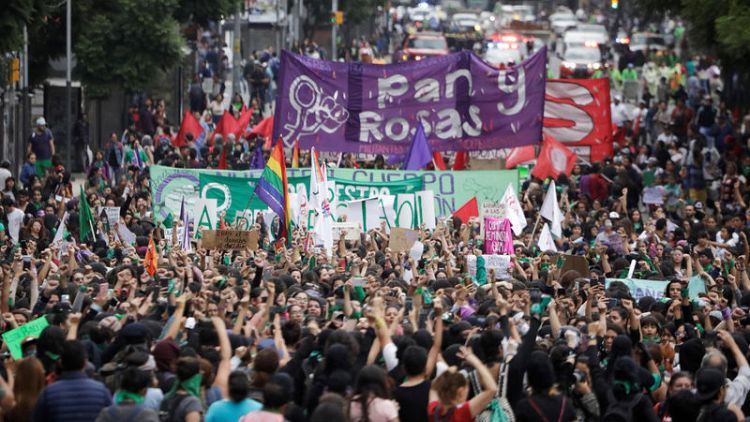MEXICO CITY (Reuters) - Mexican activists took to the streets in large cities on Saturday to demand safe and legal abortions, many wearing green bandanas that have become a symbol with the abortion rights movement in Latin America.
The protests on International Safe Abortion Day come after the Mexican state of Oaxaca on Wednesday approved a bill to legalize abortion, making it only the second region after Mexico City to permit the procedure.
Mexican President Andres Manuel Lopez Obrador earlier this month sent a bill to the federal Congress that would, if approved, grant an amnesty to women serving jail terms for what is considered a crime in all states but Oaxaca and the capital.
The country's state Congress is dominated by his leftist National Regeneration Movement though lawmakers from different parties have signalled they would support the bill.
Mexico is a predominantly conservative and Roman Catholic country and the president himself has avoided taking a clear stand. Mexico City legalized abortion in 2007.
Hundreds of people took to the streets in the capital, some using green smoke and waving banners. Local television also showed footage of protests in the states of Aguascalientes, Jalisco, Oaxaca and Veracruz.
"When a woman decides to have an abortion, she makes an intimate and profound decision," wrote Patricia Mercado, a senator from the Citizens' Movement party on Twitter. "The reasons are very much hers."
The former presidential candidate who has also promoted a bill to ban gay conversion therapy in Mexico also said the government had an obligation to provide professional and safe health services to women.
Others have criticized the movement.
The topic has long been a controversial one, but a persistent groundswell of support from the abortion rights movement has generated more discussion in Latin America in recent years.
Argentina's lower house earlier this year presented a bill to legalize abortion less than a year after the Senate rejected similar legislation.
Meanwhile, activists in El Salvador have been protesting a decision to seek a third trial for a woman who was accused of killing her stillborn son, sentenced to 30 years in prison and exonerated at an August retrial.
(Reporting by Carlos Jasso; Writing by Stefanie Eschenbacher; Editing by Stephen Coates)
